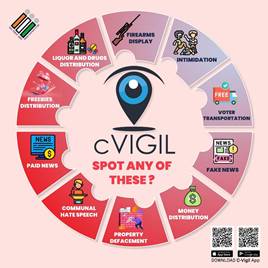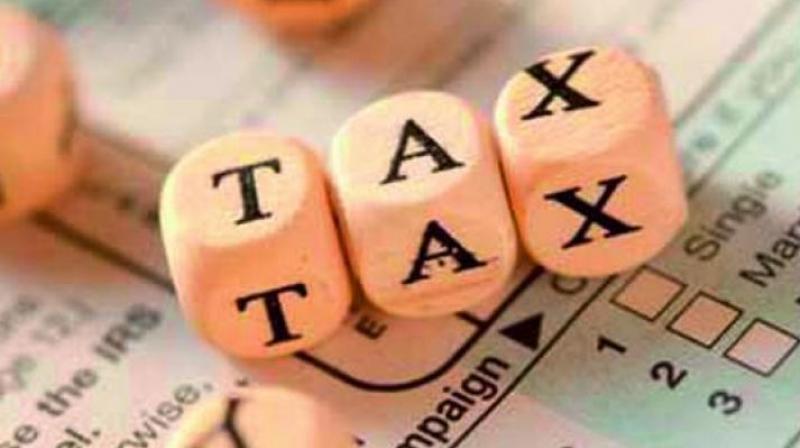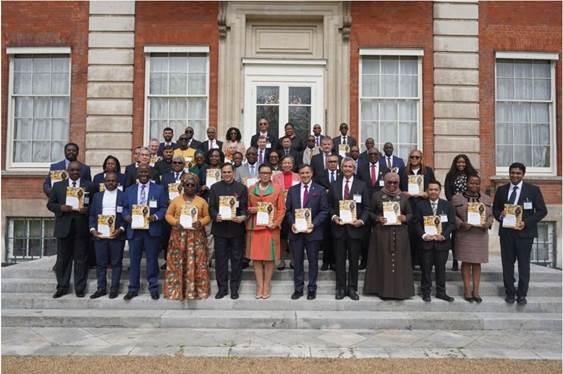ECI’s C-Vigil app a big hit with voters: over 79,000 violations reported so far
Author: BI Bureau

New Delhi: The cVIGIL app of Election Commission of India has become an effective tool in the hands of people to flag election code violations. Since the announcement of General Elections 2024, over 79,000 complaints have been received as of today. Over 99% complaints have been resolved and close to 89% of these complaints have been resolved within 100 minutes. Speed and transparency are the cornerstones of cVIGIL app.
More than 58,500 complaints (73% of the total) received are against illegal hoardings and banners. More than 1400 complaints received pertain to money, gifts and liquor distribution. Close to 3% of the complaints (2454) pertain to defacement of property Out of the 535 complaints received for display of firearms and intimidation, 529 have already been resolved. 1000 complaints reported were for campaigning beyond the prohibited period including use of speakers beyond permitted time.
cVIGIL app marks a significant leap forward in electoral oversight and reducing campaign clutter. It may be recalled that in the press conference for the announcement of the General Elections 2024, Chief Election Commissioner Shri Rajiv Kumar had urged citizens to be vigilant and use the app to report model code of conduct violations and distribution of any kind of inducements to voters.
cVigil is user-friendly and easy to operate application, which connects vigilant citizens with the District Control Room, Returning Officer and Flying Squads Teams. By using this app, the citizens can immediately report on incidents of political misconduct within minutes and without having to rush to the office of the returning officer. As soon as the complaint is sent on the cVigil app, the complainant will receive a unique ID through which the person will be able to track the complaint on their mobile.
A trinity of factors working simultaneously makes cVIGIL a success. Users capture audios, photos or videos in real-time, and a “100-minute” countdown for time-bound response to complaints is ensured. The app automatically enables a geo-tagging feature as soon as the user switches on their camera in the cVIGIL to report a violation. This means that flying squads could know the precise location of a reported violation, and the image captured by citizens could be used as evidence in the court of law. Citizens can also report complaints anonymously.
The app is one amongst the armoury of Apps built by the Commission to leverage technology and facilitate voters and political parties. /BI
More In Public Affairs
NEP-2020 aspires for inclusive excellence in school education
Rajeev Ranjan Roy
The New Education Policy-2020 (NEP-2020), unveiled recently, aims at achieving excellence in school learning by imparting quality, affordable and inclusive education to all, with an extra emphasis on those children coming from socially and educationally disadvantaged groups of the society. It is a futuristic endeavour towards building Ek Bharat, Shrestha Bharat. The previous education policies largely focussed on the issues of access and equity in giving school education, while the NEP-2020 commits to laying the foundation of a vibrant Bharat where no one is devoid of a kind of school education, which helps every student become an asset for the nation in a true sense. The unfinished agenda of the National Policy on Education 1986, which was modified in 1992, has been effectively dealt with in the NEP-2020 along with the vision behind the Right to the Free and Compulsory Education Act, 2009, which “laid down legal underpinnings for achieving universal elementary education.”
Given the undisputed role of education in nation building, the NEP-2020 rightly lays the stress on standardization and accreditation of school infrastructure and teachers as well, since education with accountability, transparency and affordability is the need of the hour, and hence the need to “empower schools, teachers with trust, enabling them to strive for excellence and perform at their very best, while ensuring the integrity of the system through the enforcement of complete transparency and full public disclosure of all finances, procedures and outcomes.” Since private sector is significantly present in the field of school education, the idea to promote ‘not-for-profit’ entities is a unique feature of NEP-2020, which at the same time intends to promote private philanthropic efforts for quality education, thereby affirming the public-good nature of education, while protecting parents and communities from arbitrary increase in tuition fees.
An equally important area, which has got due attention in the NEP-2020 is the need for efficient resourcing and effective governance through school complexes and clusters, a significant initiative in view of the fact that nearly 28 per cent of India’s public primary schools and 14.8 per cent of upper primary schools have less than 30 students. The average number of students per grade in the elementary schooling system – Grades 1 to 8 – is about 14, with a notable proportion having below six students during 2016-17, the year which also had 1,08,017 single-teacher schools, and majority of them – 85,743 – being primary schools taking care of Grades 1-5 children. It was, therefore, a pressing need to evolve a mechanism for establishing a grouping structure, say, school complexes, consisting of one secondary school together with all other schools, which lead to greater resource efficiency and more effective functioning, coordination, leadership, governance, and management of schools in the cluster. This will not only ensure optimum utilisation of resources, but will also foster the sense of oneness and togetherness among the school children, who are the future of the nation.
What further makes the New Education Policy-2020 uniquely special is its pledge for equitable and inclusive education for all, one of the great dreams of our founding fathers. Education, as the NEP-2020 rightly envisions, is “the single greatest tool for achieving social justice and quality.” Inclusive and equitable education, indeed an essential goal in its own right, is also critical to achieving a social order where every citizen has “the opportunity to dream, thrive, and contribute to the nation.” Quality, affordable and ethical education to all is the first move to break multiple social and economic barriers, which sow the seeds of exclusion, discrimination and exploitation against our own people on different parochial considerations.
Needless to say efforts were made in the past as well to bridge the educational chasm between socially and educationally disadvantaged groups (SEDGs) and the children of top social strata, but the desired results remained elusive. SEDGs account for the country’s overwhelming population, but their children’s share in quality school educational institutions has been minimal over the years. Early childhood care and education (ECCE) needs to be handled more comprehensively. According to the Unified-District Information System for Education (U-DISE) 2016-17 data, about 19.6 per cent of students belonged to Scheduled Castes (SCs) at the primary level, but this fraction fell to 17.3 per cent at the higher secondary level. These enrollment drop-outs were more severe for ST students (10.6 per cent to 6.8 per cent), and differently-abled children (1.1 per cent to 0.25 per cent), with even greater declines for female students within each of these categories. Thus, there is no scope for any complacency on the part of the government. A series of interventions including better facilities, more and more hostels, scholarships and other enabling support have been provisioned in the NEP-2020 so that the idea of ‘learning for all’ is realised in a more comprehensive manner.
Teachers are not only an integral part of an education system, but the most important stakeholder in the entire gamut of things. Their quality and ability to teach school students, when they are in their formative age, become something of paramount importance. From their recruitment to training, every precaution needs to be taken to ensure that school education is not rendered to a mere formality, but becomes a game changer. The New Education Policy-2020 comes with a basket full of tools and parameters to ensure holistic training and upgradation of teachers and their teaching skills in a sustainable manner. From continuous professional development (CPD) to career management and progression (CMP), the NEP-2020 vouches for a set of common guidelines – National Professional Standards for Teachers (NPST), which will be put in place by the National Council for Teacher Education (NCTE) in its restructured new form as the Professional Standard Setting Body (PSSB) under the General Education Council. This exercise will be carried out in consultation with National Council Educational Research and Training (NCERT), SCERTs, teachers from across levels and regions.
The teacher education will also undergo a sea-change. By 2030, the minimum degree qualification for teaching will be a 4-year integrated B.Ed. that teaches a range of knowledge content. Today B.Ed. teaching is most poorly regulated in our country ever since the standalone B.Ed. colleges were allowed to be opened up in the private sector. It is high time to take B.Ed. teaching more than seriously. The NEP-2020 stipulates that by 2021, a new and comprehensive National Curriculum Framework for Teacher Education (NCFTE-2021) will be formulated by the NCTE. NCFTE, which will also factor in the requirements of teacher education curricula for vocational education, will be revised once every 5-10 years.
In conclusion, the NEP-2020 visualizes to impart a school education which lays the foundation of a self-reliant India and also to help our country emerge as a knowledge hub. From the foundation of learning to foundational literacy and numeracy to checking drop outs and ensuring universal access to education for all and at all levels to the restructuring of school curriculum, India is in for a metamorphosis in the field of school education, recognizing, identifying and fostering the unique capabilities of each student. Tools such as multi disciplinarity, emphasis on conceptual understanding, creativity and critical thinking, ethics and human and constitutional values, full equity and inclusion, and light but tight regulatory framework are bound to do wonders. Education is a public service, a rare pursuit in nation building, which should be holistic and inclusive and must make one take pride in India and its rich, diverse, ancient and modern culture and knowledge systems and tradition. The NEP-2020 aspires so, indeed!
( The writer is a senior journalist and author. The views expressed are strictly personal.)
NEP-2020 aspires for inclusive excellence in school education
Rajeev Ranjan Roy
The New Education Policy-2020 (NEP-2020), unveiled recently, aims at achieving excellence in school learning by imparting quality, affordable and inclusive education to all, with an extra emphasis on those children coming from socially and educationally disadvantaged groups of the society. It is a futuristic endeavour towards building Ek Bharat, Shrestha Bharat. The previous education policies largely focussed on the issues of access and equity in giving school education, while the NEP-2020 commits to laying the foundation of a vibrant Bharat where no one is devoid of a kind of school education, which helps every student become an asset for the nation in a true sense. The unfinished agenda of the National Policy on Education 1986, which was modified in 1992, has been effectively dealt with in the NEP-2020 along with the vision behind the Right to the Free and Compulsory Education Act, 2009, which “laid down legal underpinnings for achieving universal elementary education.”
Given the undisputed role of education in nation building, the NEP-2020 rightly lays the stress on standardization and accreditation of school infrastructure and teachers as well, since education with accountability, transparency and affordability is the need of the hour, and hence the need to “empower schools, teachers with trust, enabling them to strive for excellence and perform at their very best, while ensuring the integrity of the system through the enforcement of complete transparency and full public disclosure of all finances, procedures and outcomes.” Since private sector is significantly present in the field of school education, the idea to promote ‘not-for-profit’ entities is a unique feature of NEP-2020, which at the same time intends to promote private philanthropic efforts for quality education, thereby affirming the public-good nature of education, while protecting parents and communities from arbitrary increase in tuition fees.
An equally important area, which has got due attention in the NEP-2020 is the need for efficient resourcing and effective governance through school complexes and clusters, a significant initiative in view of the fact that nearly 28 per cent of India’s public primary schools and 14.8 per cent of upper primary schools have less than 30 students. The average number of students per grade in the elementary schooling system – Grades 1 to 8 – is about 14, with a notable proportion having below six students during 2016-17, the year which also had 1,08,017 single-teacher schools, and majority of them – 85,743 – being primary schools taking care of Grades 1-5 children. It was, therefore, a pressing need to evolve a mechanism for establishing a grouping structure, say, school complexes, consisting of one secondary school together with all other schools, which lead to greater resource efficiency and more effective functioning, coordination, leadership, governance, and management of schools in the cluster. This will not only ensure optimum utilisation of resources, but will also foster the sense of oneness and togetherness among the school children, who are the future of the nation.
What further makes the New Education Policy-2020 uniquely special is its pledge for equitable and inclusive education for all, one of the great dreams of our founding fathers. Education, as the NEP-2020 rightly envisions, is “the single greatest tool for achieving social justice and quality.” Inclusive and equitable education, indeed an essential goal in its own right, is also critical to achieving a social order where every citizen has “the opportunity to dream, thrive, and contribute to the nation.” Quality, affordable and ethical education to all is the first move to break multiple social and economic barriers, which sow the seeds of exclusion, discrimination and exploitation against our own people on different parochial considerations.
Needless to say efforts were made in the past as well to bridge the educational chasm between socially and educationally disadvantaged groups (SEDGs) and the children of top social strata, but the desired results remained elusive. SEDGs account for the country’s overwhelming population, but their children’s share in quality school educational institutions has been minimal over the years. Early childhood care and education (ECCE) needs to be handled more comprehensively. According to the Unified-District Information System for Education (U-DISE) 2016-17 data, about 19.6 per cent of students belonged to Scheduled Castes (SCs) at the primary level, but this fraction fell to 17.3 per cent at the higher secondary level. These enrollment drop-outs were more severe for ST students (10.6 per cent to 6.8 per cent), and differently-abled children (1.1 per cent to 0.25 per cent), with even greater declines for female students within each of these categories. Thus, there is no scope for any complacency on the part of the government. A series of interventions including better facilities, more and more hostels, scholarships and other enabling support have been provisioned in the NEP-2020 so that the idea of ‘learning for all’ is realised in a more comprehensive manner.
Teachers are not only an integral part of an education system, but the most important stakeholder in the entire gamut of things. Their quality and ability to teach school students, when they are in their formative age, become something of paramount importance. From their recruitment to training, every precaution needs to be taken to ensure that school education is not rendered to a mere formality, but becomes a game changer. The New Education Policy-2020 comes with a basket full of tools and parameters to ensure holistic training and upgradation of teachers and their teaching skills in a sustainable manner. From continuous professional development (CPD) to career management and progression (CMP), the NEP-2020 vouches for a set of common guidelines – National Professional Standards for Teachers (NPST), which will be put in place by the National Council for Teacher Education (NCTE) in its restructured new form as the Professional Standard Setting Body (PSSB) under the General Education Council. This exercise will be carried out in consultation with National Council Educational Research and Training (NCERT), SCERTs, teachers from across levels and regions.
The teacher education will also undergo a sea-change. By 2030, the minimum degree qualification for teaching will be a 4-year integrated B.Ed. that teaches a range of knowledge content. Today B.Ed. teaching is most poorly regulated in our country ever since the standalone B.Ed. colleges were allowed to be opened up in the private sector. It is high time to take B.Ed. teaching more than seriously. The NEP-2020 stipulates that by 2021, a new and comprehensive National Curriculum Framework for Teacher Education (NCFTE-2021) will be formulated by the NCTE. NCFTE, which will also factor in the requirements of teacher education curricula for vocational education, will be revised once every 5-10 years.
In conclusion, the NEP-2020 visualizes to impart a school education which lays the foundation of a self-reliant India and also to help our country emerge as a knowledge hub. From the foundation of learning to foundational literacy and numeracy to checking drop outs and ensuring universal access to education for all and at all levels to the restructuring of school curriculum, India is in for a metamorphosis in the field of school education, recognizing, identifying and fostering the unique capabilities of each student. Tools such as multi disciplinarity, emphasis on conceptual understanding, creativity and critical thinking, ethics and human and constitutional values, full equity and inclusion, and light but tight regulatory framework are bound to do wonders. Education is a public service, a rare pursuit in nation building, which should be holistic and inclusive and must make one take pride in India and its rich, diverse, ancient and modern culture and knowledge systems and tradition. The NEP-2020 aspires so, indeed!
( The writer is a senior journalist and author. The views expressed are strictly personal.)



